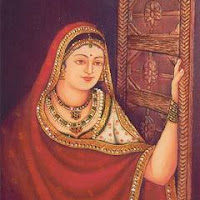
In the time of Shah Jahan, the Deccan had been controlled by three Muslim kingdoms: Ahmednagar (Nizams), Bijapur (Adilshahi) and Golconda (Qutbshahi). Following a series of battles, Ahmednagar was effectively separated, with large portions of the kingdom ceded to the Mughal and the balance to Bijapur. One of Ahmednagar's generals, a Hindu Maratha named Shahaji, joined the Bijapur court. Shahaji sent his wife Jijabai and young son Shivaji in Pune to look after his Jaggier.
In 1657, while Aurangzeb attacked Golconda and Bijapur, Shivaji, using guerrilla tactics, took control of three Adilshahi forts formerly controlled by his father. With these victories, Shivaji assumed de facto leadership of many independent Maratha clans. The Marathas harried the flanks of the warring Adilshahi and Mughals, gaining weapons, forts, and territories. Shivaji small and ill-equipped army survived an all out Adilshahi attack, and Shivaji personally killed the Adilshahi general, Afzal Khan. With this event, the Marathas transformed into a powerful military force, capturing more and more Adilshahi and Mughal territories.
Just before Shivaji Raje's his coronation in 1659, Aurangzeb sent his trusted general and maternal uncle Shaista Khan the Mughal Viceroy to the Deccan to recover lost forts occupied by the Maratha rebels. Shaista Khan drove into Maratha territory and took up residence in Pune. In a daring raid, Shivaji attacked the governor's residence in Pune during a midnight wedding celebration. The Marathas killed Shaista Khan's son, even hacking off most of Shaista Khan's hand. Shaista Khan however barely survived and was re-appointed as the administrator of Bengal and was a key commander in the war against the Ahoms.
Aurangzeb ignored the rise of the Marathas for the next few years as he was occupied with other religious and political matters including the rise of Sikhism. Shivaji captured forts belonging to both Mughals and Bijapur.
At last Aurangzeb sent his powerful general Raja Jai Singh of Amber, a Hindu Rajput, to attack the Marathas. Jai Singh won fort of Purandar after fierce battle in which the Maratha commander Murarbaji fell. Foreseeing defeat, Shivaji agreed for a truce and meeting Aurangjeb at Delhi. Jai Singh also promised the Maratha hero his safety, placing him under the care of his own son, the future Raja Ram Singh I.
However, circumstances at the Mughal court were beyond the control of the Raja, and when Shivaji and his son Sambhaji went to Agra to meet Aurangzeb, they were placed under house arrest, from which they managed to effect a daring escape.









No comments:
Post a Comment